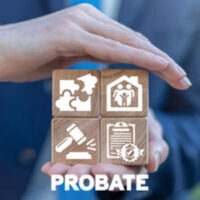What Is The Probate Process?

Sometimes, going through the probate process is necessary. By being aware of what this process consists of and working with a probate attorney it’s easier to go through the process and obtain the best possible legal outcome.
What Is The Probate Process?
The probate process is a court process that consists of the following actions:
- Going over a will and ensuring that it is legally valid.
- Gathering the assets of a deceased individual.
- Paying the debts and fees associated with these assets.
- Distributing the assets to those who are entitled to them.
Every single one of these actions serves the same basic function: to ensure that a will is legally valid and, in turn, that the assets outlined in the will are distributed properly.
The functions outlined above serve the same basic purpose: to ensure that a deceased individual’s wishes, regarding their assets, are met.
The Identification Of Probate Assets
To begin the probate process, the probate assets that once belonged to the deceased, must be identified. Right after these assets are identified, they are organized, so that they can be distributed.
Some examples of probate assets are as follows:
- Personal valuables.
- Real estate.
- Businesses.
- Vehicles.
- Investments
- Bank accounts.
Each one of these assets is considered a probate asset.
Some examples of non-probate assets are as follows:
- Real estate that is owned jointly.
- Bank accounts with named beneficiaries.
- Trust assets.
- IRAs with named beneficiaries.
None of the assets outlined above belong to the probate process.
Filing A Petition For Probate
Right after the probate assets have been identified, you must file a petition for probate. The petition that you file must be filed in the deceased’s county of residence.
Soon after the petition for probate has been filed, the will can be admitted to probate. The people connected to this will receive notice that the deceased’s estate is open for probate.
Inventorying The Estate
To go along with the identification and organization of probate assets, as clarified in the first step of probate, the estate, in its entirety, will be inventoried. By being inventoried, the total net worth of the estate will be determined.
Right after the estate is inventoried, the exact net worth of the estate will be known and the inventory list will be filed with the probate court.
Paying Off Debts And Taxes
Every valid debt and or tax will be paid, throughout the probate process. All of these debts and taxes are paid off using the funds within the estate.
Right after these debts and taxes are paid off, the final step in the probate process can begin.
Distributing The Assets
The assets outlined within a will are distributed to the heirs outlined in the will. But, if there is no will, then the assets are distributed to the deceased’s heirs by law, ensuring that they receive what they are legally entitled to.
Speak To A Florida Probate Attorney Today
Going through the probate process can be tricky but, if the probate process is necessary, then the process is absolutely worth going through.
Speak with a Villages probate attorney today at the Millhorn Elder Law Planning Group and we will assist you in obtaining the best possible legal outcome.
Sources:
help.flcourts.gov/Other-Resources/Probate
jud11.flcourts.org/Probate-Smart-Forms


